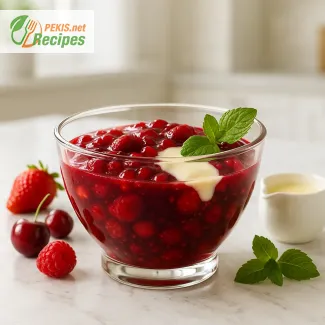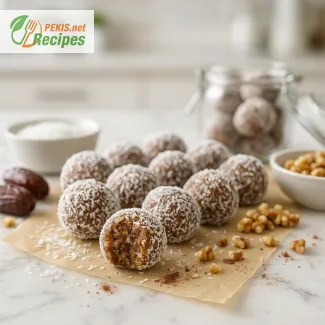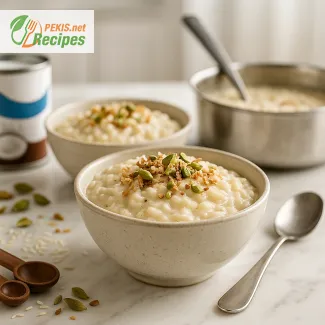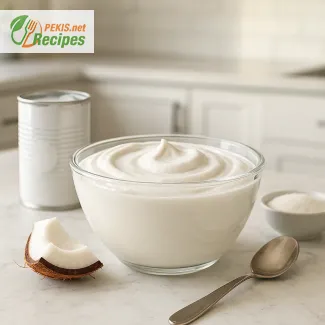Serves 4, prep 30 min, cook 10 min, total 40 min. Soft Slovenian dumplings with apricot combine tender potato dough, ripe apricots, and a golden breadcrumb coating for a dessert that feels both rustic and elegant. The dumplings deliver a balance of sweet fruit and buttery crumbs, making them ideal as a family treat or festive centerpiece. They can be stored at room temperature for 2 days, frozen for 2 months, and reheated at 150 °C for 8–10 minutes, keeping their texture light and their flavor intact. A true celebration of seasonal fruit wrapped in comfort.
PEKIS – professional chef and recipe developer with more than 25 years of experience, specialized in European and international cuisine. For this recipe, I draw on years of working with traditional Slovenian desserts, perfecting the balance between soft potato dough and juicy apricots to create dumplings that feel homely yet refined.
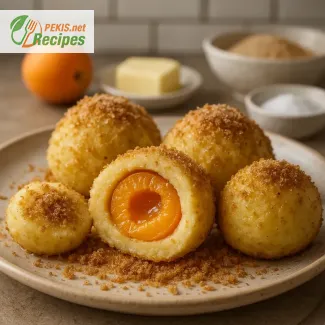
Traditional Slovenian apricot dumplings with a modern twist
A comforting dessert with rich heritage and timeless flavor
Soft Slovenian dumplings with apricot bring together the warmth of homemade cooking and the charm of Central European traditions. Their fluffy potato dough wrapped around juicy apricots creates a tender bite that balances sweetness with a subtle earthy note. Lightly coated in butter and toasted breadcrumbs, these dumplings capture the essence of rustic kitchens while still feeling refined enough for special occasions. Families often enjoy them as a dessert, but in many Slovenian homes, they can also be served as a main dish during summer when apricots are in season.
Cultural roots and culinary history
The tradition of fruit-filled dumplings runs deep across Central Europe. In Slovenia, they are known as cmoki, in Austria as Marillenknödel, and in the Czech Republic as meruňkové knedlíky. The idea is simple yet ingenious: combining locally grown stone fruits with dough that transforms into a pillowy casing once boiled. Apricot dumplings are especially tied to the summer harvest, when orchards overflow with ripe fruit. Generations have passed down these recipes, keeping alive the memory of countryside kitchens where apricot dumplings symbolized abundance, hospitality, and the joy of gathering around the table.
Why you will love this recipe
- Authentic taste from traditional Slovenian cuisine
- Juicy apricot center that bursts with natural sweetness
- Tender potato dough that remains light yet satisfying
- Golden breadcrumb coating for a nutty, buttery finish
- Versatile serving options, from family meals to festive gatherings
Ingredient influence and culinary character
The dough is typically prepared from potatoes, flour, and eggs, creating a base that is both delicate and hearty. Potatoes provide softness, flour binds everything together, and eggs lend elasticity for shaping dumplings without tearing. Apricots, the star of the recipe, add brightness and acidity that contrasts the rich dough. A coating of toasted breadcrumbs and butter enhances aroma and provides a slightly crunchy exterior. A dusting of sugar and cinnamon completes the dish with a fragrant sweetness. Each component has its purpose: starch for structure, fruit for freshness, and breadcrumbs for textural balance.
Storage and make-ahead tips
- At room temperature: keep for up to 2 days in an airtight container.
- For freezing: store uncooked dumplings up to 2 months; boil directly from frozen.
- For reheating: bake at 150 °C (300 °F) for 8–10 minutes until warmed through.
Creative variations to explore
- Plum dumplings: replace apricots with ripe plums for a deeper, tangier taste.
- Chocolate surprise: add a small piece of dark chocolate inside the apricot before wrapping in dough.
- Nut coating: swap breadcrumbs with ground walnuts or hazelnuts for a richer flavor.
- Savory version: experiment with soft cheese filling and omit sugar for a unique appetizer.
- Mini dumplings: prepare smaller bite-sized pieces for parties and buffets.
Semantic focus: Slovenian dumplings as a cultural symbol
Slovenian dumplings represent more than just a dessert; they embody seasonal cooking, regional identity, and culinary craftsmanship. The dish showcases how humble ingredients like potatoes and local fruit can be elevated into something elegant. Its popularity across Slovenia and neighboring countries highlights a shared Central European heritage, where dumplings connect families, traditions, and festive tables. Whether enjoyed warm on a summer afternoon or prepared in advance for a family celebration, these apricot dumplings carry forward the comforting flavors of the past into today’s kitchens.
- Boil the potatoes with the skin until tender, peel, and mash until smooth. Let them cool completely.
- Combine the mashed potatoes with flour, egg, melted butter, and a pinch of salt. Mix into a soft dough.
- Divide the dough into equal portions, flatten each piece, and place one apricot in the center. Carefully wrap the dough around the fruit and seal tightly.
- Bring a large pot of salted water to a gentle boil. Drop the dumplings carefully and cook until they float to the surface, about 10 minutes.
- In a pan, melt butter, add breadcrumbs, and toast until golden and fragrant.
- Remove the cooked dumplings with a slotted spoon and roll them in the toasted breadcrumb mixture.
- Sprinkle with sugar and cinnamon before serving warm.
FAQ questionCan I use other fruits instead of apricots?
Yes, plums, peaches, or even strawberries work well. The key is to use ripe, juicy fruit that holds shape during boiling.
FAQ questionWhy is my dough too sticky?
It usually means the potatoes weren’t cooled enough or there’s too much moisture. Let mashed potatoes cool fully and add flour gradually until the dough is workable.
FAQ questionCan I prepare dumplings ahead of time?
Yes, shape them and keep in the fridge for up to 24 hours before cooking. For longer storage, freeze them uncooked and boil directly from frozen.
FAQ questionHow do I prevent dumplings from falling apart in water?
Make sure the dough is sealed tightly around the fruit and drop them gently into simmering water, not boiling too vigorously.
FAQ questionWhat can I serve with Slovenian dumplings with apricot?
They pair beautifully with melted butter and toasted breadcrumbs, but you can also add a dollop of sour cream, a drizzle of honey, or a sprinkle of ground nuts.
The charm of Slovenian dumplings with apricot lies in their simplicity and heartwarming taste. Every bite combines the softness of potato dough with the sweet juiciness of apricots, wrapped in a layer of golden buttery breadcrumbs. This harmony of textures and flavors creates a dish that feels both nostalgic and timeless, appealing to anyone who values authentic comfort food.
Beyond their flavor, these dumplings represent a tradition rooted in Central European kitchens, passed down through generations as a way to celebrate the harvest season. They carry cultural meaning while remaining accessible to modern cooks who want to enjoy a dish that connects them to history yet fits perfectly into today’s dining tables.
Versatility is another reason they stand out. Served as a dessert, they shine with sugar and cinnamon. As a light main course, they bring a satisfying balance of fruit and dough. Whether shared at family gatherings or enjoyed in smaller, everyday moments, these dumplings always deliver a sense of warmth.
With just a handful of familiar ingredients and a little care in preparation, the result is a dish that feels special every time. Slovenian dumplings with apricot are more than food – they are a reminder that the simplest combinations can create lasting memories.
Allergens present in the recipe:
- Gluten (flour)
- Eggs
- Dairy (butter)
Tips for substitutions:
- Replace all-purpose flour with gluten-free flour blend to make the dumplings gluten-free.
- Use plant-based margarine instead of butter for a dairy-free option.
- Substitute egg with flaxseed meal mixed with water for an egg-free version.
- Vitamin A: 1100 IU – supports healthy vision and immune system
- Vitamin C: 9 mg – strengthens immune defense and collagen production
- Potassium: 580 mg – regulates fluid balance and supports heart health
- Magnesium: 38 mg – essential for muscle and nerve function
- Iron: 2.4 mg – contributes to red blood cell production and energy metabolism
- Calcium: 48 mg – important for bone health
- Beta-carotene: 1.2 mg – protects cells from oxidative stress and promotes eye health
- Polyphenols: 45 mg – support cardiovascular health and reduce inflammation
- Flavonoids: 25 mg – contribute to brain health and circulation
- Chlorogenic acid: 8 mg – helps regulate blood sugar levels and metabolism
